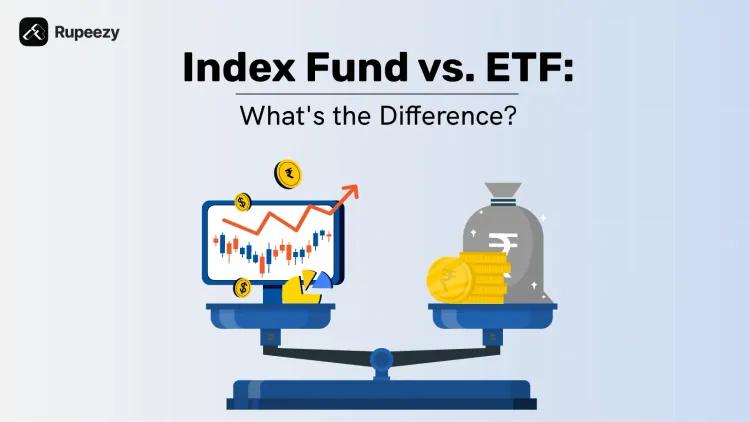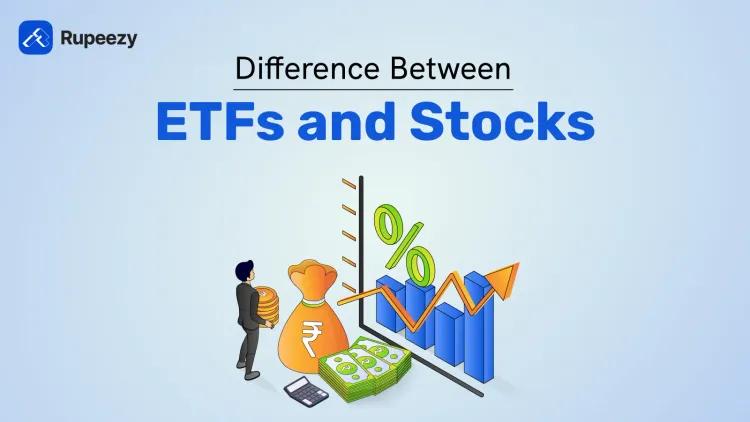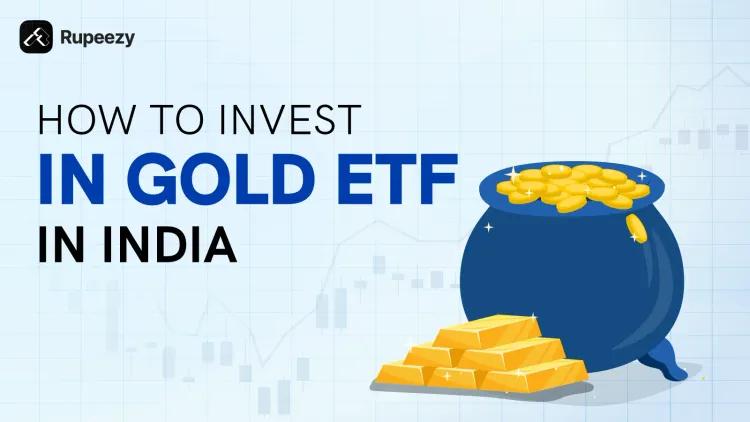Gold ETF vs SGB: Which is the Better Gold Investment?


00:00 / 00:00
Gold has always been a safe and reliable investment medium in India. Traditionally, people used to invest by buying gold jewelry or coins, but with time, the ways of investing have also changed. In today's era, investors are moving towards digital and secure options instead of physical gold, among which Sovereign Gold Bond (SGB) and Gold ETF (Exchange Traded Fund) are the most popular. Both these options are not only safe, but they are also easy to buy and sell.
Investors often have a question: Is SGB better or Gold ETF? Which option will be right in terms of tax, return, and liquidity? In this blog, we will understand the difference between these two in simple language and know which option is better for you according to your investment needs.
What is a Sovereign Gold Bond?
Sovereign Gold Bond (SGB) is a government investment scheme issued by the Reserve Bank of India (RBI) on behalf of the Government of India. This scheme allows people to invest in gold in digital form without buying physical gold. The price of SGB is based on the value of 24-carat pure gold, and it is sold on a per-gram basis. The minimum investment starts at 1 gram.
SGB earns 2.5% interest annually, which is transferred to the investor's bank account every 6 months. The tenure of this bond is 8 years, but an exit facility is available after the 5th year. Investments can be held in both demat form and physical certificate form.
The most important thing is that if SGB is held till maturity, the capital gains on it are completely tax-free. Also, it comes with the sovereign guarantee of the government, which makes its security level very high.
What is a Gold ETF?
A gold ETF (exchange-traded fund) is a type of mutual fund that is fully backed by physical gold. It trades like stocks in the stock market, and its prices are based on real-time gold prices. This means that whenever the price of gold rises or falls, the price of the Gold ETF also changes accordingly.
A demat and trading account is required to invest in Gold ETF. It does not pay any kind of interest, and the returns depend entirely on the fluctuations in the price of gold. Its biggest feature is that it is highly liquid, that is, it can be bought or sold instantly on the stock exchange whenever you want.
Gold ETFs are suitable for investors who want to make profits from gold prices in the short to medium term and who prefer more liquidity in investments.
Gold ETF vs SGB
Both Sovereign Gold Bond (SGB) and Gold ETF are popular instruments for digital gold investment, but they have several key differences. The table below explains the key difference between gold ETF and SGB in simple language:
Parameter | Sovereign Gold Bond (SGB) | Gold ETF |
Issuer | Government of India (via RBI) | Mutual Fund Houses (Asset Management Companies) |
Backing/Guarantee | Sovereign guarantee by the Government of India | Backed by 99.5% pure physical gold |
Returns | Gold price + 2.5% annual interest | Based solely on gold price movements |
Liquidity | Limited (via stock exchange + early redemption through RBI) | High (can be traded anytime on the stock exchange) |
Lock-in Period | 8 years (exit option after 5th year) | No lock-in period |
Taxation | No Long Term Capital Gains (LTCG) tax on maturity | LTCG tax applicable after 3 years |
Cost/Charges | No additional charges | Expense ratio (typically 0.5%–1%) |
Investment Mode | Demat or physical certificate | Only in demat form |
Minimum Investment | 1 gram | As low as 0.01 gram |
SGB vs Gold ETF: Detailed Explanation of the Comparison Table
1. Returns: Investing in Sovereign Gold Bonds (SGB) has a dual benefit. First, it gives returns according to the increase in gold prices, and second, it also receives a fixed interest of 2.5% per annum, which is deposited directly into the bank account every 6 months. On the other hand, Gold ETF depends entirely on the market prices of gold. There is no additional interest in it. Therefore, if it comes to long-term investment, SGB proves to be more attractive in comparison to SGB vs gold ETF returns.
2. Liquidity: Gold ETFs can be bought and sold through the stock exchange whenever desired, making them a more liquid option. In contrast, SGB has a total tenure of 8 years, and it can be sold or redeemed to the RBI only after the 5th year. For this reason, SGB is a slightly less flexible option for short-term investors.
3. Taxation: One of the features of SGB is that if the bond is held till maturity (8 years), then there is no Long-Term Capital Gain Tax (LTCG) on it. On the other hand, LTCG tax is applicable on holding a gold ETF for more than 3 years, and 20% tax has to be paid with indexation benefit. From a tax perspective, SGB is more beneficial.
4. Costs: SGB does not have any management fees or hidden expenses, making it a low-cost investment option. In contrast, Gold ETF includes an expense ratio and brokerage fee of 0.5% to 1%.
5. Investment Suitability: SGB is ideal for long-term investors who want stable and tax-free returns. On the other hand, gold ETFs are suitable for investors who want flexibility and trading facilities and who have to invest in the short to medium term.
Which is Better - SGB or Gold ETF?
Both Sovereign Gold Bonds (SGBs) and Gold ETFs are beneficial in their own ways, but which one is better depends entirely on the investment objective.
Both options have their own merits: Sovereign Gold Bond (SGB) and Gold ETF are both reliable instruments for investment, but which of these two is better completely depends on the investor's objective and strategy.
When the goal is long-term investment: If the investment is being made for a long period and fixed returns are required along with tax savings, then SGB becomes a more beneficial option. SGB gives 2.5% interest annually, and the capital gain on maturity is completely tax-free. Apart from this, it has the sovereign guarantee of the Government of India.
When there is a need for liquidity and flexibility: If the investor needs the facility of quick withdrawal or wants to earn short-term profit from the fluctuations in gold prices, then a gold ETF is a better option. An ETF can be bought and sold anytime in the stock market, and there is no lock-in period for it.
Which is Better?
Before choosing the best option between SGB and Gold ETF, it is important to see what the investor needs: tax savings, stable returns and safety, or trading flexibility and liquidity. The right option is the one that best meets these priorities.
How to Buy Gold ETF or SGB?
Both Gold ETF and SGB can be easily purchased online, but the process of buying them is slightly different.
How to buy a Gold ETF?
To buy Gold ETF, it is necessary to have a demat account and a trading account. It can be traded like any other stock on the stock market (NSE/BSE). Investors can buy and sell directly from their brokerage platforms like Upstox, Groww, Rupeezy etc.
How to buy a Sovereign Gold Bond (SGB)?
SGB is issued by the RBI every few times. It can be purchased through online banking portals (like SBI, HDFC, ICICI), post office or stock brokers. It can also be bought and sold on the stock exchange through a demat account.
Both options are modern and safe ways of investing in digital gold, but it is important to keep in mind the fees, convenience and purpose before buying.
Real-World Use Cases and Examples
Investor A- Retired Investor:
For a retired person who wants regular interest income and security, SGB is the most suitable option. Holding it also gives 2.5% annual interest, which becomes a good source of permanent income.
Investor B- Trading Investor:
For an investor who wants to cash in on the rapid fluctuations in gold prices, a gold ETF is better. It can be bought or sold in the market at any time, which maintains liquidity.
Investor C- Tax Planner:
An investor who wants to save tax in the long term prefers SGB, as the profit received on maturity is completely tax-free.
Investor D- SIP Investor:
For investors who want to make small investments in gold every month (SIP), Gold ETF is the right choice, as it can be easily managed in demat form.
Conclusion
Both Sovereign Gold Bonds (SGBs) and Gold ETFs are reliable and effective gold investment options, but the choice depends entirely on the investment objective and needs. While SGB is better suited for long-term investments and offers tax exemption along with annual interest, Gold ETF is suitable for those who want short-term trading, flexibility, and liquidity. Hence, while comparing Gold ETFs vs SGBs, it is important to understand the purpose of each. It is best to evaluate your financial plan, time horizon, and tax strategy before investing.
FAQs
Q. What is better, gold ETF or SGB?
It completely depends on the investment goal. If long term investment and tax savings are required, then SGB is a better option. On the other hand, if liquidity and short term trading are the priority, then Gold ETF is more suitable.
Q. How many gold ETFs are equal to 1 gram of gold?
Typically, one Gold ETF unit is equivalent to the value of 1 gram of gold. However, some funds also offer units as low as 0.5 or 0.01 grams, depending on the fund house.
Q. Are gold ETFs tax free?
No, Gold ETFs are not tax free. If the investment is held for more than three years, 20% LTCG tax is levied on it, in which the benefit of indexation can be availed.
Q. What are the disadvantages of SGB?
The biggest drawback of SGB is its lock-in period, which is 8 years. Although redemption is possible after the 5th year, it still has limited liquidity. Also, its secondary price in the market can sometimes be lower than the market rate.
Q. What is the disadvantage of gold ETFs?
Gold ETFs do not pay any interest and their returns are entirely dependent on the prices of gold. Apart from this, there is also an expense ratio and brokerage fee, which can reduce the returns in the long run.
Check Out These Related Articles |
The content on this blog is for educational purposes only and should not be considered investment advice. While we strive for accuracy, some information may contain errors or delays in updates.
Mentions of stocks or investment products are solely for informational purposes and do not constitute recommendations. Investors should conduct their own research before making any decisions.
Investing in financial markets are subject to market risks, and past performance does not guarantee future results. It is advisable to consult a qualified financial professional, review official documents, and verify information independently before making investment decisions.

All Category










